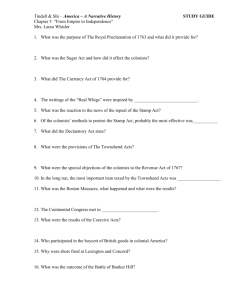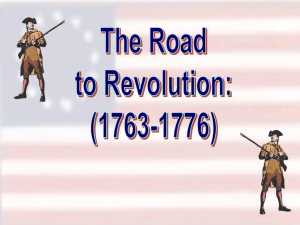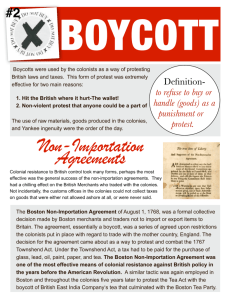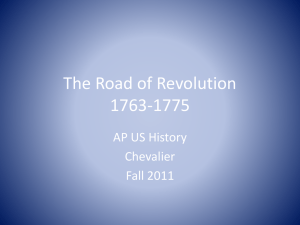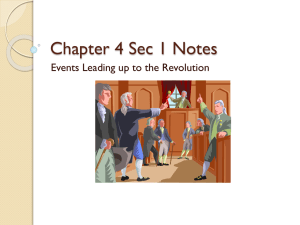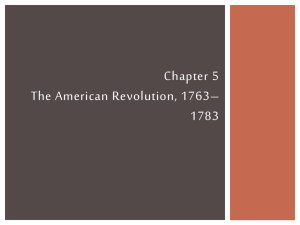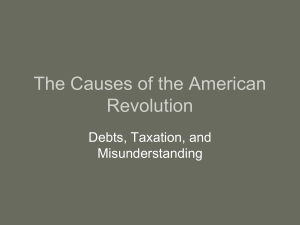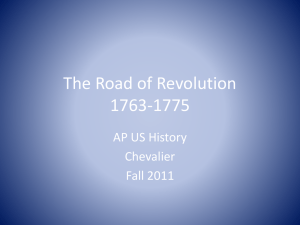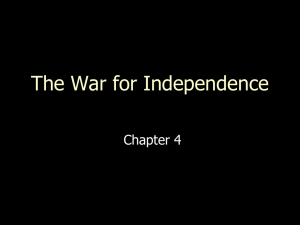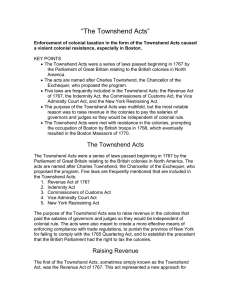File
advertisement
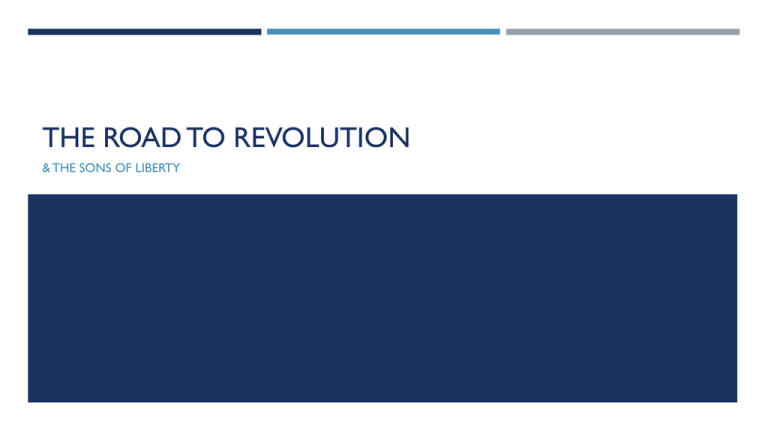
THE ROAD TO REVOLUTION & THE SONS OF LIBERTY THE HIGH COST OF VICTORY SUGAR ACT (1764) The Sugar Act was an early British attempt to raise money from the colonies. The act: Actually CUT taxes on imports of sugar and molasses BUT, it gave the British expanded power to combat smuggling (illegal trade that evaded taxes) Smugglers would now be tried in Vice-Admiralty courts (a judge appoint by Britain and located in Nova Scotia), not by local juries THE STAMP ACT (1765) RESPONSE TO THE STAMP ACT THE STAMP ACT CONGRESS COMMITTEES OF CORRESPONDENCE Networks created in opposition to early acts designed to share information across the colonies Now helped to coordinate the boycott efforts Organized public protests Informed people of their liberties as Englishmen COMMITTEES OF CORRESPONDENCE Samuel Adams, Patrick Henry, and Thomas Jefferson led the first committees Women also participated, including Mercy Otis Warren These committees involved people who would become political leaders in the Revolution and the new government after the war. SAMUEL ADAMS THE SONS OF LIBERTY Early protest were led by colonial leaders like Samuel Adams Workers, shopkeepers, average people joined protests against the Stamp Act This collection of men was called the “Sons of Liberty” The group helped lead colonial protest to Stamp Act and other taxation, and eventually, rebellion REPEAL OF THE STAMP ACT THE TOWNSHEND ACTS OF 1767 In 1767, Parliament passed the Townshend Acts, which created external duties (taxes on imports into the colonies): Placed taxes on imports of lead, glass, paper, paint, and tea Started new ways of collecting taxes to force the colonists to pay Created new Board of Customs and to punishments for smugglers and others who avoided paying taxes. RESPONSE TO THE TOWNSHEND ACTS Colonists immediately began boycotts and protests in response to the Townshend Acts British send troops to maintain order amidst protests Boycotts caused British merchants to lose money, and they in turn pressured Parliament Parliament repealed most of the Townshend Acts on March 5, 1770. Lifted the Quartering Act (which had required colonists to house and supply British soldiers) Removed British troops from Boston HOWEVER, kept a tax on tea THE BOSTON MASSACRE THE TEA ACT BOSTON TEA PARTY THE INTOLERABLE ACTS OF 1774 Called the Coercive Acts by the British, designed to punish Massachusetts and regain control of Boston, which the British saw as the hotbed of radicalism in the colonies. Boston Port Bill – closed the port of Boston until the lost tea had been paid for Admistration of Justice Act – took away trial by juryof peers Massachusetts Government Act – disbanded the colonial assembly and outlawed town-hall meetings, put a military government in place in Mass. Quartering Act – forced Bostonians to house British troops in their homes Quebec Act – extended the southern boundary of Quebec (Catholics!) FIRST CONTINENTAL CONGRESS FIRST CONTINENTAL CONGRESS The First Continental Congress resulted in: A declaration of rights, including the rights to life, liberty, property, assembly, and trial by jury A protest of taxation without representation A protest of the British army in the colonies during peacetime without the colonies’ consent TIMELINE RISING TENSIONS PAUL REVERE’S RIDE “SHOT HEARD ROUND THE WORLD” April 19, 1775 – minutemen met the British on Lexington Green A shot was fired from an unknown source After a brief skirmish, resistance fades British advance on Concord THE BATTLES OF LEXINGTON AND CONCORD
